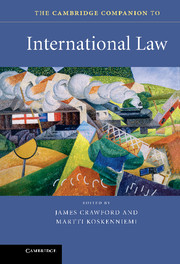Book contents
- Frontmatter
- Contents
- Preface
- Notes on contributors
- Introduction
- Part I The contexts of international law
- Part II International law and the state
- 4 Statehood
- 5 Sovereignty as a legal value
- 6 Exercise and limits of jurisdiction
- 7 Lawfare and warfare
- Part III Techniques and arenas
- Part IV Projects of international law
- Guide to electronic sources of international law
- International law chronology
- Select guide to further reading
- Index
- References
5 - Sovereignty as a legal value
from Part II - International law and the state
Published online by Cambridge University Press: 05 July 2015
- Frontmatter
- Contents
- Preface
- Notes on contributors
- Introduction
- Part I The contexts of international law
- Part II International law and the state
- 4 Statehood
- 5 Sovereignty as a legal value
- 6 Exercise and limits of jurisdiction
- 7 Lawfare and warfare
- Part III Techniques and arenas
- Part IV Projects of international law
- Guide to electronic sources of international law
- International law chronology
- Select guide to further reading
- Index
- References
Summary
‘Sovereignty’ as a distinctive attribute of the state
Chapter 4 explored the question how it is that various peoples (the Lithuanians, the Thais . . .) have a state of their own; whereas others (the Kurds, the Tibetans . . .) do not. Despite the manifest historical contingencies involved, once statehood is generally recognised – evidenced most obviously by admission to the United Nations – then a new situation arises, a category divide is established, marked by the legal category of statehood. The new state is ‘sovereign’, has ‘sovereignty’; and this is true, no matter how fragile its condition, how diminutive its resources. Vattel (1714–1767), who systematised the pre-1914 law of nations in his treatise of 1758, put it thus: sovereign states are to be considered as so many free persons living together in the state of nature, that is to say, without a common civil law or common institutions; in such a situation they are ‘naturally equal’, and inequality of power does not affect this equality; ‘[a] dwarf is as much a man as a giant; a small republic is no less a sovereign state than the most powerful kingdom’ (Vattel 1758 [2008], Bk. I, Preliminaries, §18). And despite all that has changed since 1758, the basic concept remains: states are ‘political entities equal in law, similar in form . . ., the direct subjects of international law’ (Reparation for Injuries suffered in the Service of the United Nations, ICJ Reports 1949, p. 174, 177–178). As the Badinter Commission, established to advise on legal issues arising from the breakup of the former Yugoslavia, put it, ‘such a state is characterised by sovereignty’ (Opinion No. 1 (1991), 92 ILR 165).
- Type
- Chapter
- Information
- The Cambridge Companion to International Law , pp. 117 - 133Publisher: Cambridge University PressPrint publication year: 2012
References
- 24
- Cited by



